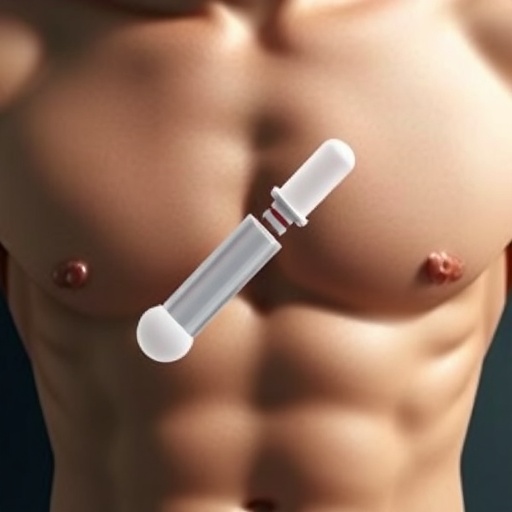In a groundbreaking study, researchers have examined the intricate relationship between testosterone levels and glucose metabolism in male patients suffering from type 2 diabetes mellitus. The findings, published in BMC Endocrine Disorders, underscore a critical interplay that could pave the way for novel therapeutic strategies in managing diabetes and associated hormonal deficiencies. As diabetes rates continue to soar globally, understanding this connection is more timely than ever.
Type 2 diabetes mellitus is a chronic condition characterized by insulin resistance and impaired insulin secretion, resulting in elevated blood glucose levels. It is well recognized that this metabolic disorder can lead to a variety of complications, including cardiovascular diseases, neuropathy, and retinopathy. However, emerging evidence suggests that hormonal imbalances, particularly deficient testosterone levels, may also play a significant role in exacerbating these conditions.
Previous research has consistently indicated that men with type 2 diabetes often present lower testosterone levels compared to their non-diabetic counterparts. This association raises pertinent questions about the causal mechanisms underlying this phenomenon. Is it the prolonged state of hyperglycemia and insulin resistance that affects testosterone production, or do low testosterone levels contribute to the worsening of glycemic control? The authors of the study sought to unravel this complex relationship through a comprehensive investigation of several biochemical markers.
In their study, Pan et al. evaluated the estimated glucose disposal rate (eGDR) alongside testosterone levels in a cohort of male patients diagnosed with type 2 diabetes. The eGDR serves as a surrogate marker for assessing insulin sensitivity, providing insights into the body’s ability to utilize glucose effectively. By correlating eGDR with testosterone levels, the researchers aimed to identify whether a significant association exists that could indicate the mechanisms by which testosterone deficiency might influence glucose metabolism.
Findings from the study revealed a notable inverse relationship between eGDR and testosterone levels in the participants. Not only did lower testosterone correlate with reduced eGDR, but it also suggested a broader implication for managing male patients with type 2 diabetes. This connection suggests that testosterone therapy, traditionally used to alleviate symptoms of hormone deficiency, could additionally contribute to improving metabolic control in these patients.
Given the complexity of hormone regulation and glucose metabolism, the authors emphasized the need for further research to decipher the causative pathways. The interrelationships between hormones, metabolic processes, and diabetes necessitate a multi-faceted approach to treatment and management. As the medical community seeks to optimize outcomes for patients with type 2 diabetes, understanding these hormonal dynamics could facilitate personalized treatment plans tailored to individual biochemical profiles.
This new evidence also opens up broader discussions about hormonal replacement therapies. While testosterone replacement therapy is often indicated in cases of hypogonadism, its use in patients without overt deficiencies, particularly those managing metabolic disorders, remains contentious. The potential benefits of such therapies must be weighed against the risks, including cardiovascular concerns, particularly in older men or those with existing heart conditions.
Moreover, recognizing the role of testosterone in metabolic health highlights the importance of routine screening for hormonal deficiencies in male diabetic patients. Clinicians may need to adopt a more integrated approach that encompasses both endocrine and metabolic assessments, ensuring that patients receive comprehensive care that addresses all facets of their health.
As awareness of this relationship grows, we may also see shifts in public health strategies aimed at preventing and managing type 2 diabetes. Education on the importance of maintaining optimal testosterone levels could emerge as a crucial component of diabetes care. Community health initiatives may need to incorporate screening for hormonal levels alongside standard glucose testing, ultimately leading to earlier interventions and improved patient outcomes.
With rising global rates of obesity and sedentary lifestyles contributing to the diabetes epidemic, understanding all the factors involved in disease progression is critical. Encouraging lifestyle changes that not only aim to control weight and improve glycemic indices but also enhance hormonal health could prove revolutionary. Comprehensive health campaigns could focus on diet, exercise, and hormonal status as interlinked elements of disease prevention.
As researchers continue to delve into the complexities of diabetes and hormone health, collaborations across endocrinology and metabolic medicine disciplines will become increasingly essential. Future studies should seek to validate these findings in larger, diverse populations to ensure comprehensive understanding across different demographics and lifestyle factors.
In conclusion, the intersection of testosterone deficiency and glucose metabolism presents an exciting avenue for deeper investigation and potential therapeutic advancements. The study by Pan et al. marks a significant step in recognizing the importance of hormonal balance in metabolic disorders, reinforcing the need for holistic approaches in the management of type 2 diabetes. As the medical field continues to evolve, the insights gleaned from such research may very well lead to transformative changes in diabetes care.
Ultimately, the implications of this research extend beyond individual patient care to larger public health strategies. As the healthcare community becomes increasingly cognizant of the relationship between various physiological systems, personalized medicine may pave the way for more effective interventions, improving the quality of life for men with type 2 diabetes.
Subject of Research: The association between estimated glucose disposal rate and testosterone deficiency in male patients with type 2 diabetes mellitus.
Article Title: Association between estimated glucose disposal rate and testosterone deficiency in male patients with type 2 diabetes mellitus.
Article References:
Pan, W., Zhao, J., Xu, J. et al. Association between estimated glucose disposal rate and testosterone deficiency in male patients with type 2 diabetes mellitus. BMC Endocr Disord 25, 259 (2025). https://doi.org/10.1186/s12902-025-02091-z
Image Credits: AI Generated
DOI: https://doi.org/10.1186/s12902-025-02091-z
Keywords: Type 2 diabetes mellitus, testosterone deficiency, glucose metabolism, estimated glucose disposal rate, hormone therapy.
Tags: BMC Endocrine Disorders study findingscardiovascular diseases and diabeteschronic condition of type 2 diabetesdiabetes complications and hormonal factorsglucose metabolism in type 2 diabeteshormonal imbalances and diabetesneuropathy and testosterone deficiencyrelationship between testosterone and glucoserole of testosterone in glycemic controltestosterone deficiency and diabetestestosterone levels and insulin resistancetherapeutic strategies for diabetes management





